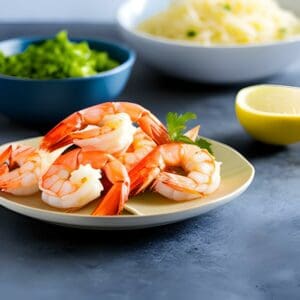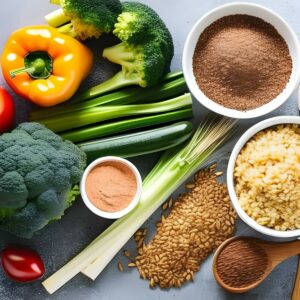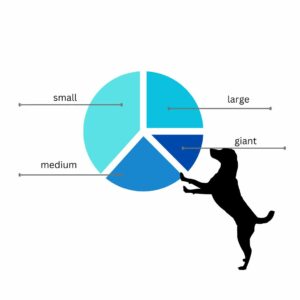We know it is hard to resist those beautiful eyes and stares when there is food around. If your dog developed a habit to beg for food every time you eat it can be challenging to change this habit in their senior years.
While we can’t deny the worry, a senior dog doesn’t have to be ill, immobile, or sad. Senior dogs can be full of life, happy, and healthy for many years.
But to make that happen the most important thing is to be well-educated on the changes, potential issues, and overall health.
In this guide, we will talk about nutritional needs for specific vital organ functions and overall nutritional suggestions to consider once your lovely baby dog turns 8.
Let’s begin.
Table of Contents
The Ideal senior dog nutrition

Nutrition for a healthy senior dog may differ from the nutritional needs of dogs with specific medical issues or those with already prescribed dog food.
Overall there are a few best practices for balanced nutrition:
1. Food should be highly-digestible (look for packaged foods with over 85% of dry matter)
2. Lower fat content
3. Protein should be above 30% (ideally listed first on the ingredients list)
4. Fish oil, either added to packaged food or as a supplement
5. High fiber content
6. Live probiotics (if the vet approves)
7. Omega-3 (Long-chain polyunsaturated omega-3 fatty acids like eicosapentaenoic acid (EPA) and docosahexaenoic acid (DHA)
What to avoid:
Limit high-fat, high-sodium, and high-calorie foods such as bacon.
To learn more, you can read Understanding Pet Food by the Association of American Feed Control Officials (AAFCO).
How many calories does my senior dog need
The number of calories a senior dog needs depends on
- their breed,
- weight,
- activity level,
- overall health status.
Generally speaking, senior dogs have lower caloric needs than younger dogs due to a decrease in metabolic rate and activity level.
According to the National Research Council, the recommended daily caloric intake for senior dogs ranges from 640 to 1,400 calories, depending on the dog’s size and activity level.
However, this is just a general guideline, and it’s important to consult with a veterinarian to determine the appropriate caloric intake for a specific senior dog.
A senior dog should consume approximately 30 calories per pound of body weight per day to maintain their weight. However, this number can vary depending on the individual dog’s metabolism, activity level, and overall health status.
For example, a 50-pound senior dog with a sedentary lifestyle may only need around 900-1000 calories per day to maintain their weight, while a 50-pound senior dog who is still very active may require closer to 1,200-1,400 calories per day.
But what if you were advised to pay attention to specific organ health?
Well, our guide should help you understand the specific nutritional needs of senior dogs and great food sources to include in their diet.
Our guide can also prepare you for the conversation with your vet.
Senior dog nutrition for a healthy gut

As dogs age, their digestive system may become less efficient and more sensitive.
To promote a healthy gut in senior dogs, a diet rich in fiber and prebiotics is a good starting point.
Fiber helps regulate the digestive system, while prebiotics nourish the beneficial bacteria in the gut, promoting a healthy microbiome. Live probiotics, can help maintain gut health by balancing the gut flora.
Foods for a healthy gut in senior dogs include:
- Lean protein (chicken, fish, and turkey)
- High-quality carbohydrates (sweet potatoes, pumpkin, and brown rice)
- Vegetables (broccoli, green beans, and carrots)
- Fruits (blueberries and apples)
Prebiotics
- Oats: are a great source of prebiotics and can also help regulate blood sugar levels.
- Apples: are high in fiber and contain pectin prebiotic that can help promote good digestive health.
- Bananas: are a good source of prebiotics and are also rich in potassium and vitamins.
Senior dogs have different nutritional requirements than younger dogs, and may also have underlying medical conditions that require specific dietary considerations, so consulting with a veterinarian is crucial.
Probiotics
- Yogurt: a good source of probiotics, but it’s important to choose a brand that is low in sugar and does not contain artificial sweeteners.
- Kefir: a fermented milk drink that is high in probiotics and can also help regulate digestion.
- Probiotic supplements: can be a convenient way to provide your senior dog with beneficial bacteria, but it’s important to choose a high-quality supplement that is specifically formulated for dogs.
Senior dog nutrition for maintaining muscle mass

According to the American Veterinary Medical Association (AVMA), approximately 20% of dogs over the age of 8 years old have some form of muscle wasting due to age-related changes in metabolism and activity level.
Dogs naturally lose muscle mass as they age, which can lead to:
- weakness,
- mobility issues,
- and other health problems.
Maintaining muscle mass is essential for senior dogs to stay active, healthy, and independent.
Senior dogs require higher levels of protein than younger dogs to maintain muscle mass. The protein should be high-quality and easily digestible.
Sources of high-quality protein include lean meats, such as chicken and turkey, and fish, such as salmon and trout. Animal-based protein sources provide essential amino acids that are crucial for muscle maintenance and growth.
In addition to protein, senior dogs require vitamins and minerals, to maintain muscle mass.
Some vitamins and minerals that are particularly important for muscle health include:
- Vitamin D: essential for muscle function and helps the body absorb calcium. Vitamin D deficiency can lead to muscle weakness and loss of muscle mass.
- Calcium: important for bone health and muscle function. Calcium deficiency can lead to weak bones and muscles.
- B vitamins: B vitamins, such as B12 and folate, are important for energy production and muscle function. Deficiencies in these vitamins can lead to muscle weakness and fatigue.
- Barley: is a good source of energy and protein, which are important for maintaining muscle mass and overall health in senior dogs. Additionally, barley contains antioxidants that can help to support the immune system and reduce inflammation.
Senior dogs also require adequate hydration to maintain muscle mass. Dehydration can lead to muscle weakness and cramping. Fresh and clean water at all times is a priority.
Senior dog nutrition for kidney health
Kidney disease is a common health issue in senior dogs, and proper nutrition can play a crucial role in managing this condition. A diet that is low in protein, phosphorus, and sodium is typically recommended for senior dogs with kidney disease.
When kidneys are not functioning properly, they are unable to filter out excess phosphorus from the body, which can lead to a buildup of phosphorus in the blood and ultimately worsens kidney disease.
Here are some common phosphorus-rich foods that should be avoided or limited in a senior dog’s diet with kidney problems:
- Dairy products: cheese, yogurt, milk, ice cream
- Meat: beef, pork, poultry, fish
- Egg yolk
- Nuts and seeds: almonds, sunflower seeds, pumpkin seeds
- Legumes: beans, lentils, peas
- Whole grains: brown rice, wheat, oats
Instead, a senior dog’s diet with kidney problems should focus on high-quality protein sources that are low in phosphorus, such as:
- Chicken
- Turkey
- Lamb
- Fish (without bones)
- Eggs whites
- Low-phosphorus vegetables such as broccoli, cauliflower, green beans, and carrots.
Protein is an essential nutrient for dogs, but excessive amounts can put a strain on the kidneys. Senior dogs with kidney disease may benefit from a diet that is lower in protein to reduce the workload on their kidneys.
Sodium is another nutrient that can be problematic for senior dogs with kidney disease. Excessive sodium intake can lead to high blood pressure, which can further damage the kidneys. A diet that is low in sodium can help manage blood pressure and reduce the risk of complications.
Senior dog nutrition for bone health
According to a study published in the Journal of the American Veterinary Medical Association, the prevalence of osteoarthritis in dogs increases with age, with up to 20% of dogs over 1 year of age and up to 80% of dogs over 8 years of age being affected.
Senior dogs are at higher risk of developing bone-related issues such as:
- osteoporosis,
- arthritis,
- and fractures.
Here are some important nutrients that senior dogs need for bone health:
Calcium: Calcium is the primary building block of bones. Adequate calcium intake can help maintain bone density and prevent bone loss. Good sources of calcium for senior dogs include:
- dairy products, such as plain yogurt and low-fat cheese,
- green leafy vegetables like kale and broccoli
Vitamin D: Vitamin D is important for calcium absorption and bone growth. Senior dogs can obtain vitamin D through sunlight exposure, but it can also be found in:
- fatty fish like salmon and sardines,
- egg yolks.
Phosphorus: Phosphorus is also essential for bone formation, but it’s important to ensure that senior dogs don’t consume too much of it as excess phosphorus can contribute to kidney problems. Good sources of phosphorus for senior dogs include:
- chicken,
- turkey,
- fish.
Protein: Protein is important for maintaining muscle mass, which in turn supports bone health. Good sources of protein for senior dogs include:
- lean meats,
- fish,
- eggs,
- dairy products.
Copper: is an essential mineral for the formation of healthy bones, connective tissues, and red blood cells. It also helps to maintain the health of the immune system and plays a role in the metabolism of iron.
Copper deficiency can cause anemia, skeletal abnormalities, and other health issues.
However, it is important to note that too much copper can also be harmful to senior dogs. Excess copper can accumulate in the liver and cause liver disease, which is a common problem in some breeds.
Senior dog nutrition for joint support

Senior dogs are prone to developing joint-related issues such as arthritis, which can cause pain, stiffness, and reduced mobility.
According to a study published in the Journal of the American Veterinary Medical Association, up to 80% of senior dogs may develop arthritis. Proper nutrition can help support joint health and potentially slow down the progression of joint-related issues.
Here are some important nutrients that senior dogs need for joint support:
Glucosamine and Chondroitin: Glucosamine and chondroitin are natural substances found in joint cartilage. Supplementing a senior dog’s diet with these nutrients may help improve joint mobility and reduce joint pain. Good sources of glucosamine and chondroitin include:
- shellfish, such as shrimp and crab,
- supplements that can be added to a senior dog’s food.
Omega:3 Fatty Acids: Omega:3 fatty acids have anti-inflammatory properties and may help reduce joint inflammation and pain. Good sources of omega-3 fatty acids for senior dogs include:
- fish oil,
- salmon,
- sardines.
Vitamin E: Vitamin E is an antioxidant that can help reduce joint inflammation and improve mobility. Good sources of vitamin E for senior dogs include:
- nuts,
- seeds,
- green leafy vegetables for senior dogs.
Vitamin C: Vitamin C is important for collagen production, which is essential for joint health. Good sources of vitamin C for senior dogs include:
- fruits and vegetables like strawberries, kiwi, and broccoli.
It’s important to note that senior dogs may have reduced caloric needs and may require a diet that is lower in fat to maintain healthy body weight. Additionally, senior dogs with existing medical conditions may have specific dietary needs, so it’s always best to consult with a veterinarian to develop a nutrition plan tailored to the individual dog’s needs.
Senior dog nutrition for brain function
Senior dogs are at higher risk of developing cognitive dysfunction, which can lead to memory loss, confusion, and behavioral changes.
According to a study published in the Journal of Veterinary Internal Medicine, up to 68% of dogs over the age of 15 years may experience cognitive dysfunction. Proper nutrition can help support brain function and potentially slow down the progression of cognitive dysfunction.
Here are some important nutrients that senior dogs need for brain function:
Omega:3 Fatty Acids: Omega:3 fatty acids have been shown to support brain health and cognitive function in aging dogs. Good sources of omega-3 fatty acids for senior dogs include:
- fish oil, salmon, and sardines.
Antioxidants: Antioxidants help protect brain cells from damage caused by free radicals, which can contribute to cognitive decline. Good sources of antioxidants for senior dogs include:
- fruits and vegetables like blueberries, spinach, and carrots.
B Vitamins: B vitamins are important for brain function and may help reduce the risk of cognitive dysfunction in senior dogs. Good sources of B vitamins for senior dogs include:
- whole grains,
- lean meats,
- leafy green vegetables.
Medium Chain Triglycerides (MCTs): MCTs are a type of fat that may help improve cognitive function in senior dogs. Good sources of MCTs for senior dogs include
- coconut oil,
- palm kernel oil.
In terms of foods to avoid for senior dogs with cognitive dysfunction, it’s important to limit:
- high-fat,
- high-sodium,
- high-calorie foods as they can contribute to weight gain and exacerbate cognitive decline.
- processed foods,
- table scraps,
- foods high in sugar should also be avoided.
Senior dog nutrition for heart function
Senior dogs are at higher risk of developing heart-related issues such as heart disease, which can cause reduced heart function and potentially life-threatening complications.
According to a study published in the Journal of Veterinary Cardiology, up to 60% of senior dogs may develop heart disease.
Proper nutrition can help support heart health and potentially slow down the progression of heart disease.
Here are some important nutrients that senior dogs need for heart function:
Protein: Protein is essential for maintaining lean muscle mass and supporting heart health. Good sources of protein for senior dogs include:
- lean meats,
- fish,
- eggs.
Omega:3 Fatty Acids: Omega:3 fatty acids have been shown to support heart health by reducing inflammation and improving blood flow. Good sources of omega-3 fatty acids for senior dogs include:
- fish oil,
- salmon,
- sardines.
L-Carnitine: L-carnitine is an amino acid that plays a key role in energy production and may help support heart function in senior dogs. Good sources of L-carnitine for senior dogs include:
- lean meats, such as chicken and beef.
Taurine: Taurine is an amino acid that is essential for heart health and may help reduce the risk of heart disease in senior dogs. Good sources of taurine for senior dogs include:
- lean meats, such as chicken and beef.
In terms of foods to avoid for senior dogs with heart-related issues, it’s important to limit
- high-fat,
- high-sodium,
- high-calorie foods as they can contribute to weight gain and exacerbate heart
Senior dog nutrition for liver function

The liver is a vital organ that performs a wide range of functions in the body, including detoxification and metabolism of nutrients.
Senior dogs are at higher risk of developing liver disease, which can lead to reduced liver function and potentially life-threatening complications.
According to a study published in the Journal of the American Veterinary Medical Association, up to 10% of dogs may develop liver disease at some point in their lifetime. Therefore, it’s important to prioritize liver health in senior dogs to help prevent or manage liver disease.
Here are some important nutrients that senior dogs need for liver function:
High-Quality Protein: Protein is essential for maintaining muscle mass and supporting liver health, but it’s important to choose high-quality protein sources that are easy to digest. Good sources of high-quality protein for senior dogs include:
- lean meats,
- fish,
- eggs.
Antioxidants: Antioxidants help protect the liver cells from damage caused by free radicals, which can contribute to liver disease. Good sources of antioxidants for senior dogs include
- fruits and vegetables like blueberries, spinach, and carrots.
B Vitamins: B vitamins are important for liver function and may help reduce the risk of liver disease in senior dogs. Good sources of B vitamins for senior dogs include:
- whole grains,
- lean meats,
- leafy green vegetables.
Zinc: Zinc is an essential mineral that plays a key role in liver function and may help reduce the risk of liver disease in senior dogs. Good sources of zinc for senior dogs include:
- lean meats,
- fish,
- eggs.
Senior dog nutrition for pancreas health
The pancreas is a vital organ that produces enzymes to help with digestion and hormones that regulate blood sugar levels.
Senior dogs are at higher risk of developing pancreatic diseases such as pancreatitis, which can lead to reduced pancreatic function and potentially life-threatening complications.
According to a study published in the Journal of the American Veterinary Medical Association, pancreatitis is one of the most common pancreatic diseases in dogs, with an estimated incidence rate of 0.6 to 2 cases per 10,000 dogs per year.
Proper nutrition can help support pancreatic health and potentially prevent or manage pancreatitis.
Here are some important nutrients that senior dogs need for pancreas health:
Low-Fat Foods: Fat is difficult for the pancreas to digest, so it’s important to choose low-fat foods for senior dogs to reduce the risk of pancreatitis. Good sources of low-fat protein for senior dogs include:
- lean meats like chicken and turkey, as well as fish.
Digestive Enzymes: Senior dogs with reduced pancreatic function may benefit from digestive enzymes, which can help with the digestion of food. These enzymes can be found in certain pet foods or can be given as a supplement.
Fiber: Fiber can help regulate blood sugar levels and may help reduce the risk of pancreatitis in senior dogs. Good sources of fiber for senior dogs include vegetables like
- sweet potatoes and green beans.
Omega-3 Fatty Acids: Omega-3 fatty acids have anti-inflammatory properties and may help reduce the risk of pancreatitis in senior dogs. Good sources of omega-3 fatty acids for senior dogs include:
- fish oil, salmon, and sardines.
In terms of foods to avoid for senior dogs with pancreatic disease, it’s important to limit high-fat, high-sugar, and high-calorie foods as they can contribute to weight gain and exacerbate the pancreatic disease.
Bonus senior nutrition tips: common question answered
What to feed an old dog that is losing weight?
Once any underlying medical issues have been addressed or ruled out by the vet, there are several dietary strategies that can be used to help an old dog regain the weight.
- Increase calorie intake by feeding them a higher-calorie diet, increasing the portion size, or adding a nutritional supplement to their meals.
2. Switch to a higher-quality diet that is rich in protein and healthy fats to maintain muscle mass and improve body condition. Look for a senior-specific dog food that contains high-quality ingredients and is formulated to meet the unique nutritional needs of older dogs.
3. Feed smaller, more frequent meals can help to improve nutrient absorption and promote weight gain.
4. Add supplements for older dogs to gain weight such as omega-3 fatty acids and digestive enzymes can help to improve the dog’s overall health and support weight gain. Consult with a veterinarian to determine which supplements are appropriate for the dog’s specific needs.
5. Consider adding wet food; it is easier to digest and more appealing to an old dog than dry food. Adding wet food to the dog’s diet can help to increase their calorie intake and encourage weight gain.
Wrapping up
Hopefully, our guide helped you understand why senior dog nutrition plays such an important role in maintaining our furry friends’ health.
Just like humans, dogs need high-quality foods to function.
-
The Majestic Bernese Mountain Dog: Life With a Berner
Imagine a friend who welcomes you with a tail-wagging symphony, whose eyes hold the warmth of a crackling fire, and whose strength could pull a cart but would rather snuggle on the couch. That’s the Berner: a family companion, a farmhand extraordinaire, and an adventurer always ready for a hike. … Read More
-
Corgi Beagle Mix: Origin, Lifespan, Health & Care Tips
The Corgi Beagle Mix, also known as the Beagi, is a unique blend that brings together the best qualities of both breeds, resulting in a charming companion. In this article, we will explore the fascinating world of the beagi, shedding light on its origin, physical characteristics, temperament, health, and care … Read More
-
Koi Fish In Winter: A Guide to Koi Pond Winter Care
Although Koi fish are relatively easy to care for, seasonal changes require extra care. And winter is no exception! Most Koi fish can withstand lower temperatures but are vulnerable to potential water freezing. In this article, we’ll talk about the best ways to take care of your Koi fish in … Read More
My Senior Paws is a participant in the Amazon Services LLC Associates Program, an affiliate advertising program designed to provide a means for sites to earn advertising fees by advertising and linking to Amazon.com. We also participate in other affiliate programs which compensate us for referring traffic.






